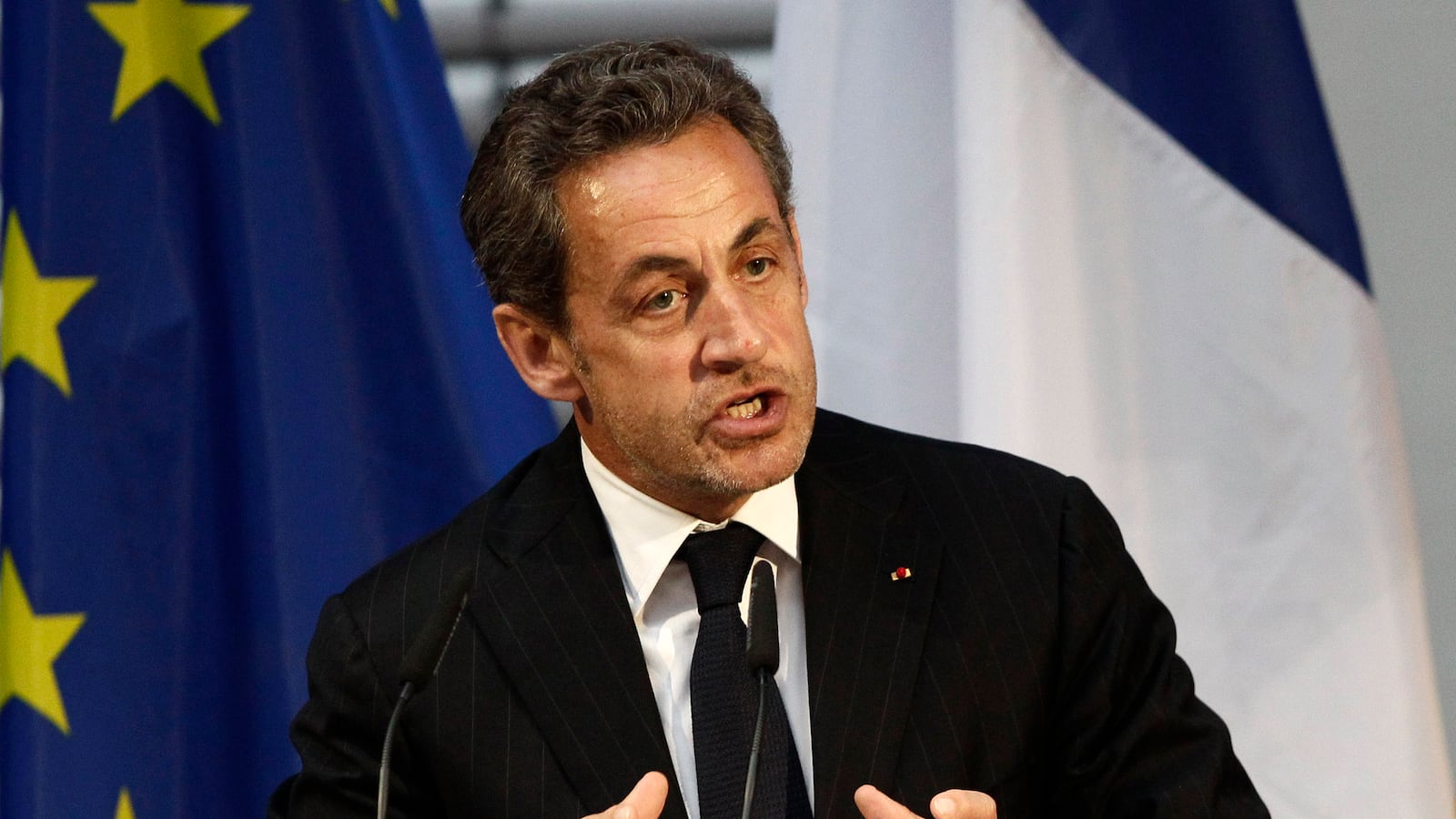Nicolas Sarkozy has broken his studied silence in a bombastic op-ed. As mounting accusations imperil his future, the former French president has lashed out wildly in a 2000-word statement in Friday’s Le Figaro. Fighting media revelations culled from phone taps, the ex-leader likens France under his successor, President François Hollande, to East Germany’s police state. Only 48 hours before French voters cast their ballots in the first round of nationwide municipal elections—President Hollande’s first mid-term test—the intent is unmistakably political.

The controversial intercepts were initially ordered by judges investigating a claim that Sarkozy’s 2007 presidential campaign accepted up to 50 million euros in illegal financing from Libya’s Col. Muammar Gaddafi. But the phone taps allegedly captured recent chatter, on a secret cell phone Sarkozy used under a fake name, which suggested impropriety in an entirely different affair.
Supposedly at issue in the secret confabs: the key question of whether Sarkozy’s presidential diaries are admissible in assorted corruption probes implicating him or his associates—and ultimately hampering his bid for a second presidential term. In the event, Sarkozy is now suspected with his lawyer of trying to co-opt a judge, gain inside information, and exert influence on France’s top court.
For two years, and very ostentatiously, Sarkozy has bitten his tongue. For his entire career—and all the more as France’s so-called omnipresident from 2007 to 2012—the compulsively pugnacious conservative had an opinion on everything. But in a thinly veiled effort to prep a comeback, Sarkozy has mostly left it to loyal deputies to relay the message (straight-faced) that the serene retiree could only be forced to return if stirred by duty as a reluctant savior of the country.
While unofficially eyeing a run in 2017, he’s played the wise man, the old hand, silent above the fray. We’re invited to believe that Sarkozy, 59, a young one-term president with unfinished business, would like nothing more than to retreat peaceably to a life of shuffleboard, macramé and supermodel songstress wife Carla Bruni.
So it counts as a major political event in France that Sarkozy has effectively abandoned his sage-in-the-wings routine to whip up a merde-storm.
Earlier this week, the investigative website Mediapart published truncated quotes from police intercepts that appeared to corroborate leaks Le Monde first broke two weeks ago. In the phone taps, Sarkozy’s lawyer, Thierry Herzog, is allegedly heard calling magistrates who had investigated Sarkozy “those bastards in Bordeaux.” (The reference was to investigations into charges against Sarkozy in the campaign financing scandal known as the Bettencourt case—charges that were dropped last October.)
Herzog is accused of having gained knowledge of a confidential judicial opinion from a magistrate with access to it, Gilbert Azibert, an alleged informer-judge Sarkozy purportedly calls “our friend.” The ex-president, who mysteriously seems to know his primary phone is tapped, apparently asks his lawyer to call back on that official cell to “give the impression of having a conversation.” Surreal.
Conservatives from Sarkozy’s Union for a Popular Movement (UMP), who managed to distract attention by accusing Hollande’s Socialist government of political espionage last week, seemed to lose steam when the embarrassing quotes broke. But Sarkozy came out swinging.
“Who could have imagined, in France in 2014, that the right to the respect of private life could be flouted by phone taps? The right to secrecy in conversations between a lawyer and his client voluntarily ignored?” Sarkozy writes in Le Figaro. He warns ominously that anyone could be a target. As a public figure, he says, he can defend himself, but most won’t be so lucky.
“Still today, everyone who phones me should know that they will be listened to. You read that right. This is not a scene from the marvelous film ‘The Lives of Others’ on East Germany and the activities of the Stasi,” Sarkozy writes. “This isn’t about the actions of some dictator in the world toward his opponents. This is about France.”
Socialist responses have been swift and angry. Hollande called the dictatorship allusion “intolerable.” At least two Socialist ministers likened Sarkozy’s bluster to the chronically embattled former Italian Prime Minister Silvio Berlusconi. And Interior Minister Manuel Valls, whom Sarkozy mocks for claiming he knew nothing of the phone-taps, mused Friday, “I have the sentiment in reading this text that Sarkozy, taken by a form of rage, wants to destroy everything to protect himself. Protect himself from what, I don’t know. It’s up to the justice system to say.”
Valls maintains the the Stasi talk disqualifies Sarkozy’s entire argument.
Indeed, critics scoff at Sarkozy’s apparent naiveté. A lawyer by trade, he is expected to know the legal bases for phone taps, and that lawyer-client privilege wouldn’t make a private conversation inadmissible if the lawyer participates in the infraction discussed.
Sarkozy was also France’s so-called top cop as Interior Minister for five years before he won the presidency. Le Monde pointed out on Friday that when Sarkozy held those posts he spent a decade expanding France’s legal surveillance arsenal. (Phone taps, as it happens, more than quadrupled between 2001 and 2008.)
Sarkozy’s allies have echoed the ex-president’s argument en masse, especially his line that he isn’t above the law, but he shouldn’t be beneath it, either. UMP leader Jean-François Copé called Sarkozy’s op-ed a “courageous response” in the face of “incessant and violent accusations”—and made a last push for votes on Sunday.
The nationwide municipal elections do indeed raise the stakes, creating ripe terrain for political scoops and raging reaction. Sunday’s vote is the unpopular Hollande’s first mid-term test, an election that generally punishes ruling parties. Conventional wisdom in France has scandals keeping disgusted mainstream voters home and favoring the throw-the-bums-out rhetoric of Marine Le Pen’s National Front. Pollsters have been predicting disillusioned leftist voters are particularly likely to abstain. Sarkozy’s combative op-ed might well rally his own disgruntled troops from the UMP for an election bounce.
Indeed, the last lines in Sarkozy’s screed are a pointed dare to Hollande, the self-styled Mr. Normal. “To all those who may have dreaded my return, let them rest assured that the best way to avoid it would be that I may live a simple, tranquil life… basically, like a ‘normal’ citizen.”
Call it Sarkozy’s first 2017 campaign pledge: To put down the macramé needles to pick up the pen if not, indeed, the sword.






